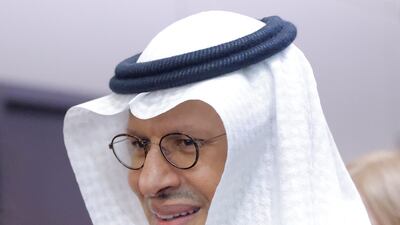Opec and its allies will remain “proactive” as global oil markets face uncertainty, Saudi Arabia's Energy Minister has said.
“In face of a wide range of uncertainties, Opec+ has no choice but to remain pro-active and pre-emptive, and this is not an easy task, especially that the market has the tendency to overreact to news in both directions,” Prince Abdulaziz bin Salman said in an interview with official news agency SPA.
He also said the decision by Opec+ in October to reduce output by 2 million barrels per day was the “right one” for the stability of oil markets.
The move, which faced criticism from the White House, resulted in oil prices surging past $94 a barrel briefly.
Brent, the benchmark for two thirds of the world’s oil, has since lost about 15 per cent of its value, dragged down by concerns of an economic slowdown and slower growth in China, the world’s largest crude importer.
The decision by the bloc of 23 oil-producing countries was described as “very risky, unfortunate, and there were suggestions that it was driven by political motivations”, Prince Abdulaziz said.
“Again, in retrospect, the Opec+ decision turned out to be the right one.”
Prince Abdulaziz also spoke about “serious inaccuracy” in certain global estimates about oil demand.
Earlier this year, the International Energy Agency said that global oil stocks had plunged by more than 600 million barrels in 2021.
However, based on the agency’s supply and demand assumptions, they should have declined by 400 million barrels, according to a Bloomberg report.
“Opec+ has maintained its demand figures for 2021 while some others have grossly and consistently underestimated historical and current demand,” Prince Abdulaziz said.
“It would not come as a surprise if the issue of missing barrels re-emerges in early 2023, keeping up with the same pattern of underestimating demand yet again in 2022.”
Last week, the International Energy Agency raised its global oil demand growth estimate for this year and the next on rising crude consumption in India, China and the Middle East.
The Paris-based agency now expects demand to grow by 1.7 million barrels per day in 2023, up from its previous estimate of 1.6 million bpd.
At its December meeting, Opec+ stuck to its oil-production targets amid uncertainty over sanctions on Russian crude.
“As Opec+, we will not hesitate in handling any market situation,” Prince Abdulaziz said.
“The more credible we are, the easier our task is in bringing stability to markets, and the more stability we bring, the greater our credibility is cemented and recognised.”
Global economic growth is forecast to be as weak as it was in 2009 — during the financial crisis — as a result of the Ukraine conflict and its impact on the world economy, the Institute of International Finance said in a report this month.
The world economy is projected to grow by 1.5 per cent next year, compared with 0.6 per cent in 2009, the IIF said.
This assessment comes after the International Monetary Fund cut its global economic growth forecast for next year due to the effects of the Ukraine conflict, broadening inflation pressures and a slowdown in China, the world’s second-largest economy.
The fund maintained its global economic estimate for this year at 3.2 per cent but downgraded next year's forecast to 2.7 per cent — 0.2 percentage points lower than the July forecast.

